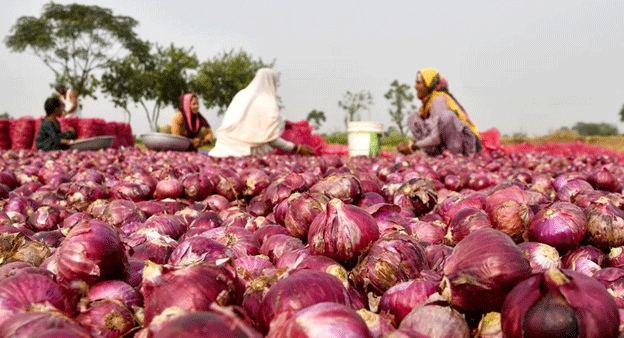India’s Union government recently reduced the export duty on onions from 40% to 20%, along with removing the $550 per tonne Minimum Export Price (MEP). While this move comes as a relief to many in Maharashtra, the nation’s largest onion-producing state, it has also stirred mixed reactions among farmers and traders, especially as the rabi onion season is winding down.
Maharashtra produces nearly 40% of India’s onions, with Lasalgaon—the largest wholesale onion market in Asia—serving as a major hub. The recent export duty slash comes on the heels of a December 2023 export ban and the high-duty imposition that followed, which had sparked protests among onion farmers, particularly in a state where agriculture remains a key livelihood.
Impact on Farmers and Traders
The decision to lower export duties and remove the MEP came at a critical juncture. Many onion farmers had already sold most of their rabi produce when the announcement was made. As a result, they may not fully benefit from the policy change, which could have fetched better prices if implemented earlier.
Local traders, too, have voiced concerns, noting that although the export duty was slashed, software updates at ports were delayed, preventing immediate exports under the new terms. This delay has added to the frustration of both traders and farmers eager to capitalize on the open international market.
Some onion farmers in Lasalgaon pointed out that while reducing the export duty will likely increase demand for Indian onions, it may be too late for them to see significant benefits from this year’s harvest. The crop is seasonal, and with the bulk of the rabi onions already harvested and sold, only a portion of farmers may manage to profit from exports.
Political Reactions
As Maharashtra heads into election season, politicians across the board have been quick to seek credit for the duty reduction. The export ban and high duties on onions were key issues in the state, creating unrest among farmers. In a state where onion farming is an integral part of rural economies, these policy changes are likely to play a significant role in political campaigns leading up to the elections.
Despite the praise from some quarters, opposition parties argue that the government’s move came too late. They argue that the delay in addressing farmers’ needs, especially during the critical harvesting period, has already caused financial damage to a significant portion of Maharashtra’s agricultural community.
A Step Forward or a Missed Opportunity?
While the reduction in onion export duty is a welcome relief for some, the timing and implementation issues have left others dissatisfied. Many farmers who had already sold their produce will see minimal impact, while traders are still waiting for seamless export processes to resume.
This situation underscores a broader issue: timely policy interventions are essential to truly support farmers and help them gain from global markets. For now, Maharashtra’s onion farmers will have to look toward the next season, hoping for better timing and more favorable policies to boost their incomes.







